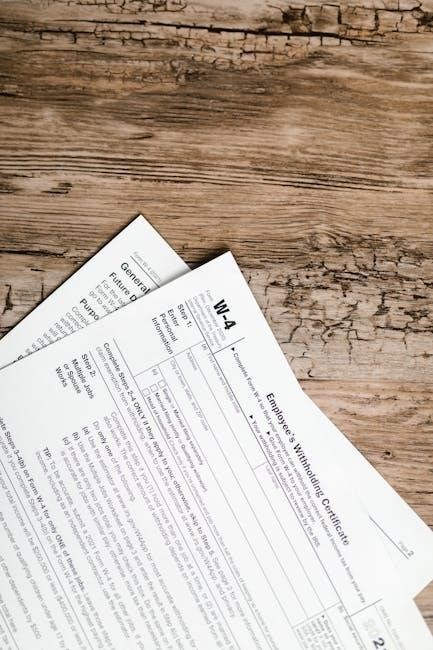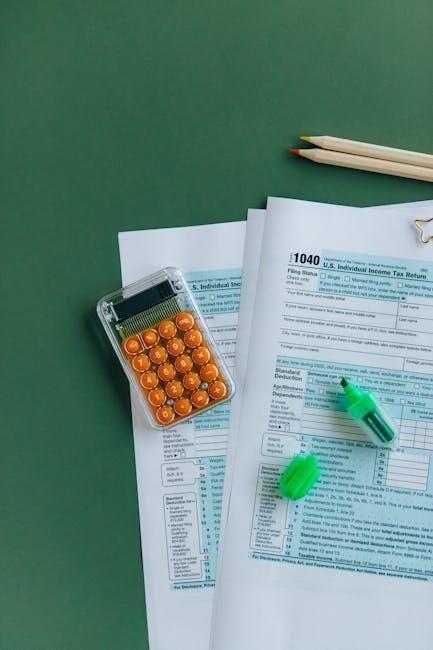MA Trustee Certificate Forms are essential documents in Massachusetts‚ verifying a trust’s existence and a trustee’s authority. They are typically in PDF format and legally required for real estate transactions‚ and can be downloaded from official state websites.
What is a Trustee Certificate?
A Trustee Certificate is a legal document that verifies the existence of a trust and confirms the trustee’s authority to act on its behalf. It provides essential details such as the names of the grantor‚ trustee‚ and beneficiaries‚ along with the trustee’s powers and responsibilities. This certificate is often required in real estate transactions involving trust property‚ ensuring that the trustee has the legal right to execute actions like buying‚ selling‚ or transferring property. It must be notarized and recorded with the appropriate registry of deeds‚ serving as a critical proof of authority in Massachusetts.
Why is a Trustee Certificate Necessary in Massachusetts?
A Trustee Certificate is necessary in Massachusetts to legally verify a trustee’s authority to act on behalf of a trust‚ especially in real estate transactions. It ensures the trustee has the legal right to execute actions like buying‚ selling‚ or transferring property. The certificate must be recorded with the Registry of Deeds‚ providing official proof of the trustee’s powers and responsibilities. This document is required by Massachusetts law‚ specifically under M.G.L. Chapter 184‚ Section 35‚ to avoid disputes and ensure legitimacy in trust-related transactions. Without it‚ transactions may be deemed invalid or lead to legal penalties.
Overview of Trustee Certificate Forms in PDF Format
Trustee Certificate Forms in PDF format are standardized legal documents designed to streamline processes in Massachusetts. These forms are readily available online‚ often through official state or county websites‚ ensuring easy access for trustees. The PDF format allows for straightforward downloading and printing‚ making it convenient to prepare and execute the necessary documentation. The forms typically include sections for trustee and beneficiary information‚ powers granted to the trustee‚ and successor trustee details. They are widely used in real estate transactions‚ ensuring compliance with Massachusetts laws and regulations‚ and are a crucial part of maintaining legal integrity in trust-related matters.

Legal Requirements for Trustee Certificates in Massachusetts
Trustee certificates in Massachusetts must comply with M.G.L. Chapter 184‚ Section 35‚ requiring notarization and signatures under penalties of perjury‚ ensuring legal validity and compliance.
Massachusetts General Law (M.G.L.) Chapter 184‚ Section 35
M.G.L. Chapter 184‚ Section 35 governs trustee certificates in Massachusetts‚ making them a legal requirement for real estate transactions involving trusts. This section dictates that trustee certificates must be notarized and signed under penalties of perjury‚ ensuring their authenticity and compliance with state law. It also allows the recording of a trustee certificate in place of the full trust document‚ simplifying the process for real property transactions. This law is particularly relevant for non-testamentary trusts and outlines the necessary procedures to validate a trustee’s authority‚ ensuring legal clarity and protection for all parties involved in the transaction.
Penalties of Perjury and Signature Requirements
Trustee certificates in Massachusetts must be signed under penalties of perjury‚ ensuring the accuracy of the information provided. This legal requirement mandates that signatories swear to the document’s truthfulness‚ with penalties imposed for any false statements. The certificate must be notarized‚ adding an additional layer of verification. Signatures are typically required from all acting trustees‚ and in some cases‚ beneficiaries or other authorized parties may also need to sign. Compliance with these requirements is crucial to validate the trustee’s authority and ensure the document’s enforceability in legal and real estate transactions‚ protecting all parties involved from potential fraud or misrepresentation.
Recording the Trustee Certificate with the Registry of Deeds
Recording a trustee certificate with the Registry of Deeds is a critical step in Massachusetts. This process ensures the document is part of the public record‚ providing legal notice of the trust’s existence and the trustee’s authority. Proper recording involves submitting the notarized and completed certificate to the appropriate county’s Registry of Deeds‚ where it is indexed and made accessible for future reference. This step is essential for validating real estate transactions‚ protecting the interests of all parties‚ and maintaining transparency in trust-related matters. The recorded certificate serves as official proof‚ adhering to state laws and regulations.

Structure and Content of MA Trustee Certificate Forms
MA Trustee Certificate Forms outline essential trust details‚ including grantor‚ trustee‚ and beneficiary information‚ trustee powers‚ and successor provisions. They must be signed and notarized for validity.
Key Elements of a Trustee Certificate
A trustee certificate must include the trust’s name‚ creation date‚ and type. It should list the grantor‚ trustee(s)‚ and beneficiaries‚ along with their roles and responsibilities. Key details include the trustee’s powers‚ such as managing assets or making distributions. The document must also outline successor trustee provisions and be signed under the penalties of perjury.
Notarization is required to validate the certificate’s authenticity. These elements ensure the certificate’s legal enforceability and compliance with Massachusetts regulations‚ particularly M.G.L. Chapter 184‚ Section 35.
Grantor‚ Trustee‚ and Beneficiary Information
The trustee certificate must clearly identify the grantor‚ the individual who created the trust‚ and the trustee(s)‚ responsible for managing its assets. Beneficiaries are also listed‚ detailing who will receive trust benefits. Each party’s full legal name‚ address‚ and capacity within the trust must be included. This information ensures transparency and legal compliance‚ verifying the trust’s structure and the roles of each participant. Accurate identification of these entities is essential for validating the trust’s operations and authority‚ especially in real estate transactions governed by Massachusetts law.
Trustee Powers and Authority
The trustee certificate outlines the specific powers and authority granted to the trustee‚ ensuring they can legally manage and act on behalf of the trust; This includes powers to sell‚ purchase‚ or transfer real property‚ as well as handle financial transactions and asset distributions. The document must clearly define the trustee’s scope of authority‚ which is typically derived from the trust agreement. In Massachusetts‚ this ensures compliance with legal standards and provides third parties with assurance of the trustee’s legitimacy to act. The certificate also specifies any limitations on the trustee’s authority‚ maintaining accountability and adherence to the trust’s objectives.
Successor Trustees and Their Role
A successor trustee assumes the duties of the original trustee upon their resignation‚ incapacitation‚ or death. The trustee certificate must name these individuals to ensure a smooth transition of authority. Successor trustees are essential for maintaining continuity in trust management and safeguarding beneficiary interests. They must adhere to the same legal obligations as the original trustee‚ including acting in good faith and fulfilling the trust’s objectives. Proper documentation of successor trustees in the certificate is crucial for avoiding disputes and ensuring the trust’s continued operation in accordance with Massachusetts law and the grantor’s intentions;

Obtaining MA Trustee Certificate Forms
MA Trustee Certificate Forms are readily available online in PDF format. They can be downloaded from official Massachusetts government websites or county-specific resources like Barnstable or Berkshire county sites.
Where to Find Trustee Certificate Forms Online
Trustee Certificate Forms for Massachusetts can be easily accessed online through official state government websites. The Massachusetts Registry of Deeds and legal resource portals offer downloadable PDF versions. Additionally‚ county-specific websites‚ such as Barnstable or Berkshire‚ provide forms tailored to local requirements. Using search terms like “trustee certificate” or “certificate of trust” can help locate these documents efficiently. Always ensure to download forms from reputable sources to guarantee accuracy and compliance with state laws.
Downloading Forms from Official Massachusetts Websites
Official Massachusetts websites provide convenient access to Trustee Certificate Forms in PDF format. Visit the Massachusetts Registry of Deeds website or other state-sanctioned legal portals. Use specific keywords like “trustee certificate” or “certificate of trust” to locate the forms quickly. Ensure you download from reputable sources to comply with state laws. These forms are designed to meet legal requirements and are often county-specific‚ such as Barnstable or Berkshire. Always verify the form’s relevance to your needs before downloading and completing it.
County-Specific Forms (e.g.‚ Barnstable‚ Berkshire‚ etc.)
Massachusetts Trustee Certificate Forms are often tailored to specific counties‚ such as Barnstable or Berkshire. These county-specific forms ensure compliance with local regulations and legal requirements. When downloading forms‚ it is crucial to select the correct county where the real estate is located. Using the wrong form can lead to legal issues or delays. Always verify the form’s applicability to your specific situation. County-specific forms are available on official Massachusetts websites‚ such as the Registry of Deeds or other government portals. Ensure you consult local authorities or legal experts to confirm the form’s accuracy and relevance.

Completing the Trustee Certificate Form
Filling out the Trustee Certificate Form requires careful attention to detail‚ ensuring all fields are accurately completed‚ including grantor‚ trustee‚ and beneficiary information‚ and trustee powers.
Step-by-Step Guide to Filling Out the Form
Begin by identifying the correct trustee certificate form for your county in Massachusetts. Carefully review the form to ensure it aligns with your specific needs. Start by filling in the grantor’s name‚ trustees’ names‚ and beneficiaries’ details; Clearly outline the trustee’s powers and authority‚ referencing the trust document. Include information about successor trustees if applicable. Ensure all signatures are notarized‚ as this is a legal requirement. Double-check for accuracy and completeness before submission. Finally‚ record the completed form with the appropriate Registry of Deeds to ensure compliance with Massachusetts state law.
Notarization Requirements for Trustee Certificates
Notarization is mandatory for trustee certificates in Massachusetts to ensure authenticity and authority. The trustee must sign the document in the presence of a licensed notary public‚ who verifies the trustee’s identity and affixes their official seal or stamp. This step is a legal requirement and a critical part of the validation process. The notary ensures that the trustee acknowledges the document’s contents under penalties of perjury. Specific notarial certificates may be required for Massachusetts documents‚ so compliance with state-specific notarial procedures is essential to avoid rejection or delays in processing. Proper notarization confirms the document’s enforceability and legitimacy.
Common Mistakes to Avoid When Completing the Form
When completing a trustee certificate form‚ common errors include incomplete or inaccurate information‚ such as missing trustee or beneficiary details. Ensure all signatures are notarized properly‚ as Massachusetts requires this for validity. Failing to record the document with the Registry of Deeds can lead to legal issues. Additionally‚ using outdated forms or incorrect county-specific versions can result in rejection. It’s crucial to adhere strictly to the legal requirements outlined in M.G.L. Chapter 184‚ Section 35. Double-check all data and seek legal advice if unsure to prevent delays or penalties.
Role of the Trustee in Massachusetts
A trustee in Massachusetts acts as a fiduciary‚ managing trust assets and ensuring compliance with legal requirements. They must maintain transparency and act in the best interest of beneficiaries.
Duties and Responsibilities of a Trustee
A trustee in Massachusetts has fiduciary duties to manage trust assets prudently and act in beneficiaries’ best interests. This includes maintaining accurate records‚ distributing assets according to the trust‚ and ensuring compliance with legal requirements. Trustees must avoid conflicts of interest and disclose relevant information to beneficiaries. They are also responsible for filing necessary documents‚ such as tax returns‚ and ensuring all actions align with the trust’s terms. Proper execution of these duties is crucial to uphold the trust’s integrity and fulfill the grantor’s intentions effectively.
Trustee’s Authority in Real Estate Transactions
In Massachusetts‚ a trustee’s authority in real estate transactions is formally established through a trustee certificate. This document‚ often in PDF format‚ confirms the trustee’s legal right to act on behalf of the trust‚ including buying‚ selling‚ or managing real property. The trustee must adhere to the terms of the trust and exercise their authority responsibly. The certificate is typically required by title companies and attorneys to ensure the legitimacy of the transaction. Without it‚ real estate dealings may be delayed or deemed invalid. The trustee’s powers are outlined in the trust document and are governed by Massachusetts General Law (M.G.L.) Chapter 184‚ Section 35.
Liability and Legal Obligations of a Trustee
A trustee in Massachusetts bears significant legal obligations‚ acting as a fiduciary responsible for managing trust assets in the best interest of beneficiaries. They must adhere to the terms of the trust document and comply with state laws‚ including Massachusetts General Law (M.G.L.) Chapter 184. Trustees are liable for breaches of their fiduciary duty‚ such as mismanagement of funds or conflicts of interest. They must maintain accurate records and provide transparency to beneficiaries. Failure to fulfill these obligations can result in legal action‚ personal liability‚ or removal from their role. Their duties are further outlined in the trustee certificate‚ ensuring accountability and compliance with legal standards.

Beneficiaries and Their Rights
Beneficiaries in Massachusetts have the right to receive detailed information about the trust‚ including its terms and assets. They are entitled to transparency and accountability from trustees‚ ensuring their interests are protected under state law and the terms of the trust document.
Who Are the Beneficiaries of a Trust?
Beneficiaries of a trust are individuals or entities designated to benefit from the trust’s assets. They are typically named in the trust document by the grantor and may include heirs‚ family members‚ or organizations. Beneficiaries are entitled to receive distributions‚ such as income or principal‚ as outlined in the trust agreement. In Massachusetts‚ beneficiaries have legal rights to trust information‚ ensuring transparency and accountability from trustees. The trustee certificate‚ required for real estate transactions‚ often identifies beneficiaries and outlines their interests‚ providing clarity on how trust assets are managed and distributed according to the grantor’s intentions.
Beneficiary Rights to Trust Information
Beneficiaries of a trust in Massachusetts have the right to receive information about the trust‚ ensuring transparency and accountability. They are entitled to details about the trust’s terms‚ the trustee’s actions‚ and the management of trust assets. This includes access to financial records‚ distributions‚ and any significant decisions impacting the trust. Beneficiaries can request a copy of the trust document or a certification of trust‚ which summarizes key provisions. Massachusetts law supports these rights‚ requiring trustees to provide timely and accurate information to beneficiaries‚ fostering trust and ensuring compliance with the grantor’s intentions and legal obligations.
How Beneficiaries Can Obtain a Copy of the Trust Document
Beneficiaries can obtain a copy of the trust document by requesting it directly from the trustee. Massachusetts law grants beneficiaries the right to access trust information‚ ensuring transparency. If the trustee refuses‚ beneficiaries may seek legal action to compel disclosure; Additionally‚ a trustee certificate‚ which summarizes key trust provisions‚ can be provided as an alternative. This document includes details about the trust’s existence‚ the trustee’s authority‚ and beneficiary information. Beneficiaries can also consult legal counsel to guide them through the process of obtaining the trust document or certificate‚ ensuring their rights are protected under Massachusetts law.

Special Considerations for MA Trustee Certificates
- Special Needs Trusts: Require specific language to protect beneficiaries’ eligibility for government benefits.
- Condominium Associations: Certificates must be recorded to validate trustees’ authority.
- Non-Testamentary Trusts: Governed by M.G.L. Chapter 203‚ Section 2.
Trustee Certificates for Special Needs Trusts
Trustee certificates for special needs trusts are tailored to protect beneficiaries with disabilities while preserving their eligibility for government benefits. These certificates must include specific language ensuring compliance with Medicaid and Supplemental Security Income (SSI) requirements. They often outline restrictions on distributions to avoid jeopardizing benefit eligibility. Additionally‚ these certificates may require detailed provisions for successor trustees and clear guidelines for managing trust assets responsibly. The use of such certificates ensures that the beneficiary’s quality of life is maintained without risking essential support programs.
Condominium Associations and Trustee Certificates
Trustee certificates play a crucial role in condominium associations‚ as they provide legal proof of the identity and authority of the association’s governing board members. These certificates are typically recorded with the registry of deeds in the county where the condominium is located. They are essential for verifying the legitimacy of actions taken by the board‚ such as entering into contracts or conducting real estate transactions. In Massachusetts‚ condominium associations often require trustee certificates to ensure compliance with state laws and regulations governing shared ownership properties. This document helps maintain transparency and accountability in the management of condominium affairs.
Non-Testamentary Trusts and Their Requirements
Non-testamentary trusts‚ such as living trusts‚ require specific documentation to validate their existence and the trustee’s authority. In Massachusetts‚ a trustee certificate is essential for non-testamentary trusts involving real estate transactions. This document must be recorded with the registry of deeds or the land court. It includes details about the trust’s creation‚ the trustee’s powers‚ and beneficiary information. Compliance with Massachusetts General Law (M.G.L.) Chapter 184‚ Section 35 ensures the certificate’s legality. Proper execution and notarization are required‚ and amendments must be recorded if changes occur. This process ensures transparency and protects all parties involved in the trust’s administration and transactions.

Amendments and Updates to Trustee Certificates
Amendments to trustee certificates in Massachusetts are necessary when changes occur‚ such as trustee resignations or beneficiary updates. Forms must be updated and re-recorded with the Registry of Deeds.
When an Amended Trustee Certificate is Needed
An amended trustee certificate is required when changes occur‚ such as a trustee’s resignation‚ new trustees appointed‚ or modifications to beneficiary information. Updates to trust powers or terms also necessitate an amendment. Any alteration in the trust’s structure or authority must be documented and filed. The amended certificate ensures the trust’s legal validity and reflects current details accurately. Failure to update may lead to legal complications. Proper recording with the Registry of Deeds is essential to maintain compliance with Massachusetts laws and ensure seamless real estate transactions or trust operations.
How to Update a Trustee Certificate
To update a trustee certificate‚ download the latest form from Massachusetts’ official website or the relevant county site. Complete the form with accurate‚ updated information‚ ensuring all changes are clearly stated. Notarization is required to validate the document. Sign the form in the presence of a notary public and attach any necessary supporting documents. Record the updated certificate with the Registry of Deeds for the county where the real property is located. This ensures legal compliance and maintains the trust’s validity. Always verify the form’s requirements and follow Massachusetts state laws for proper execution and filing.
Recording Amendments with the Registry of Deeds
Recording amendments to a trustee certificate with the Registry of Deeds is crucial for legal validation. Once updates are made to the certificate‚ the document must be filed in the county where the real property is located. Ensure the amended form is fully completed‚ notarized‚ and signed by the trustee. Submit the document to the Registry of Deeds‚ along with any required fees. This process ensures that changes are legally recognized and provides a public record of the updates. Failure to record amendments may result in legal complications or delays in real estate transactions. Always verify filing requirements with local authorities.

Trustee Certificates and Real Estate Transactions
Trustee certificates are crucial in MA real estate transactions‚ verifying a trustee’s authority to act on behalf of the trust. They ensure legality and compliance with state laws.
Role of Trustee Certificates in Property Sales
Trustee certificates play a pivotal role in MA property sales by verifying the trustee’s authority to execute transactions. They ensure compliance with legal requirements‚ streamline processes‚ and provide clarity to all parties involved‚ making them indispensable for secure and legitimate real estate dealings;
Transferring Real Property as a Trustee
Transferring real property as a trustee in Massachusetts requires a valid trustee certificate to confirm authority. The trustee must execute the transfer in accordance with the trust’s terms and state laws. The certificate‚ signed under penalties of perjury‚ ensures the trustee’s legal capacity to act. It is recorded with the Registry of Deeds‚ providing public notice of the transaction. Failure to present a properly executed certificate can delay or invalidate the transfer. This process ensures transparency and compliance with Massachusetts General Law‚ protecting all parties involved in the real estate transaction.
Legal Implications of Missing or Incomplete Certificates
Miscellaneous or incomplete trustee certificates can lead to significant legal consequences in Massachusetts. Without proper documentation‚ real estate transactions may be delayed or invalidated‚ causing financial losses and potential disputes. The absence of a legally required certificate can result in penalties‚ as it undermines the authority of the trustee to act. Incomplete forms may lead to challenges in court‚ questioning the legitimacy of property transfers. Additionally‚ missing documents can hinder the verification process required by law‚ further complicating the legal standing of the trust and its transactions. This emphasizes the importance of ensuring all certificates are accurate and complete.

Notary and Acknowledgment Requirements
MA trustee certificates require notarization‚ involving penalties of perjury‚ ensuring authenticity. Specific notarial certificates are mandated for Massachusetts documents‚ with special considerations for out-of-state notarization processes.
Notarization Process for Trustee Certificates
The notarization process for trustee certificates ensures the authenticity of the document. A trustee must appear before a notary public‚ present valid identification‚ and sign the certificate in their presence. The notary then verifies the trustee’s identity‚ witnesses the signature‚ and affixes their official seal or stamp. This process confirms the document’s validity under Massachusetts law‚ particularly under the penalties of perjury. Proper notarization is crucial for maintaining the legal integrity of the trustee certificate‚ ensuring it is recognized by official entities such as the Registry of Deeds.
Out-of-State Document Notarization Requirements
For out-of-state documents‚ Massachusetts requires specific notarization procedures. If a trustee is outside MA‚ they must visit a notary public in their state who follows Massachusetts guidelines. The notary must use an acknowledgment certificate compliant with MA laws. The document should include the notary’s commission expiration date and official seal. If the notary is from another state‚ they must adhere to Massachusetts’ legal standards for authenticity. This ensures the document’s validity when recorded in MA‚ maintaining compliance with state regulations and requirements for real estate transactions involving trusts.
Specific Notarial Certificates for Massachusetts
Massachusetts requires specific notarial certificates for trustee certificates‚ ensuring authenticity and compliance with state laws. These certificates must include the notary’s official seal‚ signature‚ and commission expiration date. The acknowledgment or jurat must follow Massachusetts’ legal standards‚ verifying the trustee’s identity and authority. For real estate transactions‚ the notary must confirm the trustee’s capacity and the document’s validity under state regulations. Non-compliance can lead to rejection by the Registry of Deeds. Always use an authorized notary public familiar with Massachusetts’ requirements to ensure the document’s enforceability and acceptance in legal proceedings.





